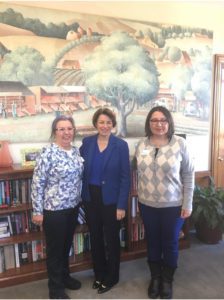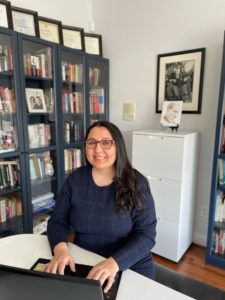Katharina Clark has always wanted to make a difference. For as long as she can remember, Katharina has held a keen interest in the healthcare sector. Before she was diagnosed with adult-onset Still’s disease (AOSD) and relapsing polychondritis, she even volunteered for the National Institutes of Health (NIH) as a translator for rare disease patients and their families. After her diagnoses, Katharina still wanted to make an impact, to improve the world around her not only for herself, but for others within the rare disease community. In our interview, she explains:
“My goal is to raise awareness. Even if I impact one person, just being able to educate them on how to communicate with the rare disease patient or advocates, I think I’ll be conquering something. That is one of the reasons I created Perrarus.”
Perrarus – a Latin word meaning “very rare, exceptional.” Katharina founded Perrarus in March 2019. Selling products from apparel and drinkware to pillows and phone accessories, Perrarus will be donating some of its funds to help advance rare disease research.
Recently, Katharina and I sat down to discuss her diagnostic journey, how she is the only patient her doctor has seen with both AOSD and relapsing polychondritis, what the Perrarus means to her, and how those within the rare disease community can better advocate for themselves.
Katharina’s Story
Katharina Clark, now 41, is many things: a rare disease patient, an American with Turkish roots, a business woman, a wonderful person to share a coffee and chat with. She speaks French, English, and Turkish, which helped her during her time as a translator at NIH. She attended a French high school in Ankara, Turkey before eventually moving to the United States.
In 2005, Katharina went to school for public relations and advertising, tools that now help her in developing and growing Perrarus. Over the next decade or so, Katharina ran her own business called Zermatt Outerwear, sold her business to buyers like Sears, Kmart and Groupon, and trained as a Pharmacy Tech. She was married, living in Minnesota, and working for the Mayo Clinic. Here, she helped with translation between Turkish families and doctors, researchers, and other stakeholders. Also, she was working at the Medical Records. In 2015, she even helped a family who came from Turkey to get treatment at the NIH; the mother had been waiting to bring her daughter for treatment for years.
During this time, Katharina also spoke with Senator Klobuchar. Katharina was active in both supporting patients and caregivers, and in global issues.

Then, after moving to Washington, D.C. in November 2017, Katharina had a small accident. Her dog pulled her during a walk and she fell, breaking her right shoulder. At the time, the doctors ran some bloodwork and considered doing surgery. Katharina remembers:
“One of the nurses said that my white blood count was incredibly high. But because I just had a traumatic injury, we didn’t think it was anything to worry about.”
By the time she got back to work in 2018, some other potentially worrisome symptoms were arising: rashes on her back, a consistent cough, a lingering cold. At first, Katharina thought that she was just experiencing a cold, so she treated it like that. But her symptoms worsened to the point where she had to go to the emergency room, where she was told to visit an allergist.
The Diagnostic Journey
Later that same week, Katharina found an NIH-trained doctor in her neighborhood. She explains:
“After some testing, Dr. Boltansky, M.D. told me that he wasn’t sure exactly what I was experiencing, but he did know that it was not allergies. He asked if I remembered any other injuries or losing my balance. That’s when I told him about the weekend, I broke my shoulder.”
After some further testing and evaluating the medical records, the allergist explained that her WBC counts and CRPs all indicated that Katharina was battling some sort of cancer or infection – an illness that was already in her body. She was provided a taper dose of prednisone and allergy medicine to help with her rashes and voice loss, but her condition continued to worsen. Katharina visited a family doctor, who said that it was probably nothing, and both hematology and oncology doctors. During these visits, she was told that she did not have cancer – but the doctors were not really sure what was going on.
Katharina was frustrated and fatigued, so much so that she had to stop working. She credits her mother’s tenacity with inspiring her on the diagnostic journey, explaining:
“My mom was a biology teacher, and a breast cancer survivor, so she did not stop seeking answers. Before moving to the states, she had great doctors in Istanbul, so she sent them my medical records. They told us that my condition was serious, and I needed to come there immediately.”
Her visit to Turkey, where she underwent additional testing, was both fun and informative. To begin, Katharina was able to visit her best friend and join in on her high school reunion. She says it was one of the best times in her life, like a child without a curfew. Then, Katharina – on her 38th birthday – received her diagnosis: adult-onset Still’s disease.
About Adult-Onset Still’s Disease (AOSD)
Adult-onset Still’s disease (AOSD) is a rare systemic inflammatory disorder with no known cause. However, some believe it may be caused by an abnormal immune response. It is characterized by episodes – usually lasting for several days – of high fevers, joint pain, and a salmon-colored rash. AOSD is variable, meaning some patients may experience frequent or recurrent flares while others may only experience one episode. Risk factors include being between 15-25 or 36-46 years old, and being female. Again, symptoms – and how each patient will progress – are variable and hard to predict. Some symptoms may include:
- A high fever which lasts for days and worsens at night
- Unintended weight loss
- Joint and/or muscle pain and stiffness
- Sore throat
- Swollen lymph nodes
- Skin rash
- Enlarged liver and/or spleen
- Swollen tissue around the heart and lungs
Join us in Part 2 as we discuss learning to live with the AOSD diagnosis, Katharina’s secondary diagnosis of relapsing polychondritis, and how she hopes Perrarus will spur advocacy within the rare disease sphere.



